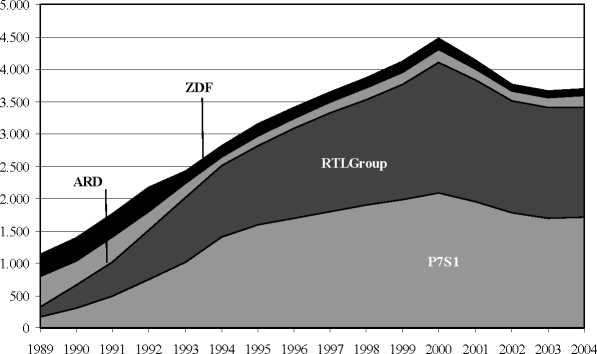Budzinski/Wacker: Springer-ProSiebenSat.1-Merger
12
ally, market transparency is considerably high and sufficient buyer power cannot be
identified.
Two other assessments seem to be more problematic from an economic perspective.
Firstly, the Bundeskartellamt (2006: 31-34) substantiates its assessment that
RTLGroup and P7S1 form an ‘uncompetitive duopoly’ by the parallel development of
market shares and prices. Figure 2 shows the development of TV advertising revenues
in Germany for the major players.
Figure 2: Development of TV Advertising Revenues 1989-2004 (in mio. Eur)

Source: SevenOne Media 2006.
The Bundeskartellamt (2006: 31) points out that in a market environment of declining
advertising revenues, constant market shares persisting over several years argue
against substantial competition between the actual players. In fact, however, the mar-
ket volume is not declining in general. After a steady market expansion in the eighties
and nineties due to the market entries of private stations, in the last years it is more
likely to show a kind of cyclical movement because the demand for advertising is not
irrespective of business cycles. Nevertheless, the market shares have not varied sig-
nificantly during the last years, neither for the whole groups as shown in figure 2 nor
for single stations. According to economic theory, however, constant market shares
(on an annual basis) and parallel movements of average prices do not suffice for the
conclusion that no competition takes place (Buccirossi 2006).
Concerning parallel price movements, it should be considered that prices are usually
adjusted during a year according to the success of a program, which is not visible in
prices averaged over all programs of one station (or group of stations) for one year.
The competition agency relies on the latter indicator, which might be problematic.
Furthermore, the higher price level after 8 p.m. is not only (and maybe to a lesser ex-
tent) caused by lessening competition due to the restriction for public stations not to
show spots after 8 p.m. as argued by Bundeskartellamt (2006: 34). Instead, it is driven
by the goal of reaching a greater audience at this prime time, particularly concerning
More intriguing information
1. How much do Educational Outcomes Matter in OECD Countries?2. Monetary Policy News and Exchange Rate Responses: Do Only Surprises Matter?
3. Implementation of Rule Based Algorithm for Sandhi-Vicheda Of Compound Hindi Words
4. Industrial Employment Growth in Spanish Regions - the Role Played by Size, Innovation, and Spatial Aspects
5. Empirically Analyzing the Impacts of U.S. Export Credit Programs on U.S. Agricultural Export Competitiveness
6. The name is absent
7. The constitution and evolution of the stars
8. The name is absent
9. Are Public Investment Efficient in Creating Capital Stocks in Developing Countries?
10. Running head: CHILDREN'S ATTRIBUTIONS OF BELIEFS